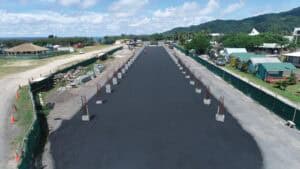Private and public sectors have welcomed a $40 million infrastructure injection.
A much needed $40m cash injection has been welcomed as the private and public sectors have met for talks.
Cook Islands National Infrastructure Committee reached out to the private sector at a workshop in Rarotonga on Wednesday.
About 50 representatives from public and private sectors gathered at the Crown Beach Resort to share the details of the National Infrastructure Investment Plan (NIIP) only days after it was announce that $40million of a $60m grant from New Zealand will contribute to infrastructure initiatives.
Infrastructure Committee chair, Michael Henry who is also the chair of the Cook Islands Investment Corporation, welcomed news of a $40m injection, saying “The next 18 months will be about focusing on getting people into work”.
“The grant from New Zealand will be a significant help. There are a number of shovel ready projects that will get the support.”
The next 18 months will be significant in terms of putting the monies to work and the $40m will provide much needed stimulus to the economy, says Henry.
More than 100 infrastructure projects with a combined value of $685 million were tabled in the nation’s updated NIIP, announced in August.
The 136 candidate infrastructure projects are grouped into 36 infrastructure programmes based on commonalities of sector, geographic location and similarities in design.
A Summary of NIIP programmes shows several big ticket items tagged as major (high value – significant effort). They include $76.2m for Rarotonga Airport upgrades, $66m for Rarotonga Government buildings, $55m for Rarotonga sanitation improvements and $46m for the Rarotonga water security programme.
Henry said the $685 million plan was ambitious and there were no guarantees.
“Every year priorities change and it is unlikely that we will deliver on all the projects. “We are in a Covid-19 situation and we will adapt to it.” In assessing economic impacts and funding, the Government identified five funding sources – domestic revenues, concessional borrowing by Government, applied directly or onlent to state owned enterprises (SOEs), self-financing by SOEs, using cash reserves of commercial loans, overseas development partners and financing in the private sector, in the form of domestic, foreign private investment or public-private partnerships.
According to National Infrastructure Investment Plan document, unprecedented economic fallout from the COVID-19 pandemic had changed the fiscal landscape for infrastructure projects and is expected to have a lasting effect in the medium term.
From 2018/19 to 2019/20, revenue fell by 7.8 per cent, largely driven by the pandemic in the last quarter of the 2019.20 fiscal year. Also, prior to the onset of the pandemic in 2018/2019, Cook Islands’ net debt was 17 per cent of FDP, well under the net debt rule of 35 per cent of GDP. To cope with the pandemic, Government took out three loans from the Asian Development Bank and the Asian Infrastructure Investment Bank to finances its economic response plan. Net debt has more than doubled over the past two years from $86.3m in 2019. In June this year, the net debt ratio was 41.9 per cent and the current public debt is $280 million.



